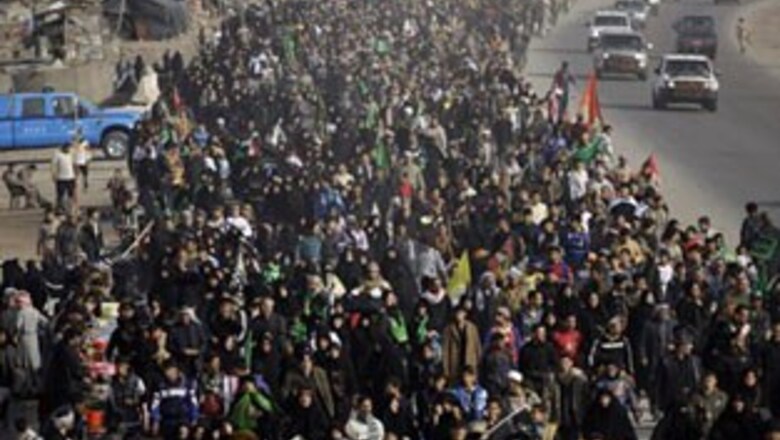
views
Baghdad: A car bomb ripped through a crowd of Shiite pilgrims outside the holy city of Karbala on Friday, sending many fleeing into the path of a suicide attacker who detonated a second bomb in coordinated blasts that killed at least 40 people and wounded 150.
The twin bombing came on the final day of an annual Shiite religious observance, which has been the target of three large-scale attacks in Iraq this week alone. In Pakistan, two bombs targeting Shiites observing the same holy day Friday killed at least 25 people and wounded around 100 more.
The bloodshed in Iraq is likely to further stoke tensions between the Shiite-led government and Sunnis over the push to ban some candidates from March 7 parliamentary elections.
The US is concerned the ban could destabilise Iraq, crippling efforts to reconcile majority Shiites and Sunnis who dominated Iraq until Saddam Hussein's ouster in 2003.
There was no immediate claim of responsibility for Friday's blasts, but Prime Minister Nouri al-Maliki blamed al-Qaida and Saddam loyalists, saying in a statement the two groups failed to ignite sectarian strife and destabilize the country with the attacks on pilgrims.
Shortly after noon, a parked car bomb exploded on a road clogged with pilgrims 6 miles (10 kilometers) east of one of three main entrances to the holy city of Karbala, two health ministry officials said. The explosion sent throngs of pilgrims running down the highway and straight into the path of a suicide car bomber who detonated a second vehicle, they said.
At least 154 people were wounded in the consecutive blasts, the officials said.
An Iraqi police official gave a different version of events, saying two mortar rounds struck the area, driving pilgrims into the path of the suicide car bomber. Such conflicting accounts are common in the chaotic aftermath of bombings in Iraq.
The officials all spoke on condition of anonymity because they were not authorized to release the information.
The twin blasts came at the height of the pilgrimage when roads around Karbala, 50 miles (80 kilometers) south of Baghdad, were clogged with people trying to reach the city by Friday to observe the climax of Arbaeen — the holy day marking the end of 40 days of mourning that follow the anniversary of the death of Imam Hussein, a revered Shiite figure.
The number of Shiites — estimated in the millions — makes the annual observance a prime target for suspected Sunni militants. In each of the past two years, attacks during the ceremonies killed around 60 pilgrims, down from the more than 340 killed in 2007.
Two other major attacks this week targeted Shiite pilgrims, killing at least 77 people.
Also on Friday, a roadside bomb struck a bus carrying pilgrims through Baghdad, killing two and wounding 13, police and hospital officials said on condition of anonymity.
Iraqis angered by the violence questioned how anyone managed to plant bombs in an area where the government had deployed an additional 30,000 security forces and brought in the use of bomb-sniffing dogs and other intelligence and surveillance equipment.
Mohammad Rahim, a 40-year-old restaurant worker in Karbala, accused the government of being too preoccupied with political infighting ahead of the elections to ensure security for the pilgrims.
"The Iraqi government is busy with elections in this period," he said. "The security forces are not focused on security."
The attacks were likely to further strain relations between al-Maliki's government and Iraq's Sunni politicians over the push to ban some 450 candidates from next month's election.
The ban — which would have affected candidates with suspected ties to Saddam's outlawed Baath party — was overturned Wednesday by an appeals court. But al-Maliki denounced the decision, and election officials have asked Iraq's highest judicial authority for a final ruling.
The U.S. is concerned the ban could undercut the credibility of the election among Iraqis and cripple efforts to reconcile majority Shiites and the Sunnis who dominated Iraq under Saddam. Sunni political leaders say the ban was a political tool to marginalize them by the Shiite-led government, even though many of the names on the list are Shiite.
U.S. Ambassador Christopher Hill applauded the decision to lift the ban and has said that Iraq must have a credible election.
But Al-Maliki warned Hill not to get meddle and said Iraq must not bow to U.S. pressure.
"We will not allow American Ambassador Christopher Hill to go beyond his diplomatic mission," al-Maliki said late Thursday in a statement published on his political coalition's Web site.
The US Embassy dismissed the warning, and defended Hill's comments.
"Iraqi leaders take on board our views but then make their own decisions," Philip Frayne, an embassy spokesman in Baghdad, said in an e-mail to The Associated Press. "Of course, we respect Iraqi sovereignty."

















Comments
0 comment